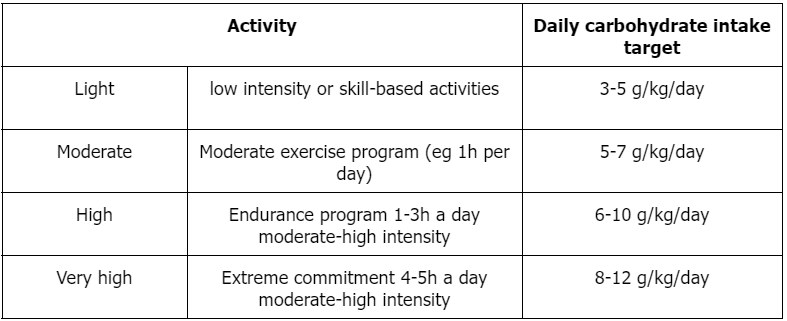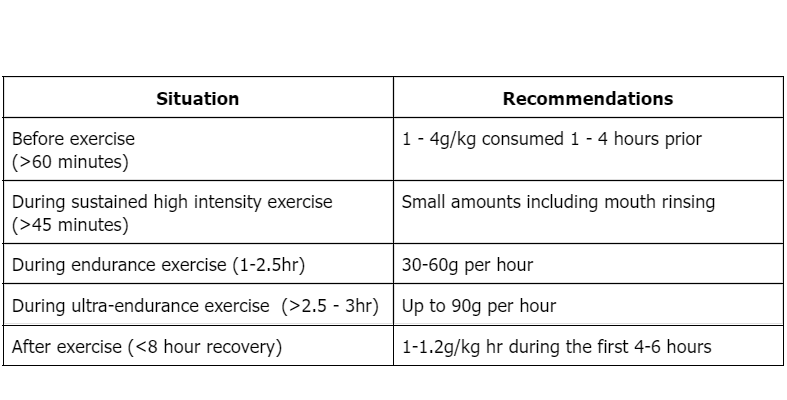Why say "Bye" to Sugar and Carbs?: Understanding The Role of Sugar and Carbohydrate in Sports Performance and Exercise.
Carbohydrates have received a bad rep in recent years. With the increasing trends of obesity and diabetes, people are worried that carbohydrates are bad for health. As a result, low-carb diets have become popular for weight loss. This diet trend has also caught on amongst athletes and sport scientists.
Are carbohydrates all that bad? Let’s find out the truth about carbs and how it affects sports performance.
What are carbs?
Carbohydrates, also commonly known as “carbs”, are an important macronutrient in the human diet. It is the major source of energy in our body cells and we need them in large quantities. Based on its structure, carbohydrates can be categorized into simple and complex carbohydrates.
Simple carbohydrates are known as “sugars” because it contains shorter chains of sugar molecules called “saccharides”. We can find simple carbohydrates in fruits, vegetables, dairy products and processed foods like table sugar, energy bars, sweetened drinks, and confectionaries. If it tasted sweet, it is most likely simple carbohydrates.
Complex carbohydrates are longer and more complex chains of saccharides. We can find complex carbohydrates in starches, such as grains and cereals, as well as dietary fiber from vegetables, legumes, and fresh fruit. Complex carbohydrates rarely taste sweet.
Are they all “bad”?
Carbohydrates have been associated with obesity and diabetes. This is because simple sugar causes a rapid rise in blood glucose level and insulin secretion from the pancreas. Examples of simple sugar are glucose, sucrose, fructose, lactose and maltose. When sugar is consumed in excess, it can lead to diabetes and obesity.
Complex carbohydrates are made up of longer and more complex chemical structure that require a longer time to digest. Therefore, blood sugar increases slower and gradually compared to simple sugars. However, different sources of complex carbohydrates affect our blood sugar differently depending on their nutrient profile. Complex carbohydrates, such as whole grains and fibres are healthier options compared to refined grains. This is because of their blunted effects on blood glucose and have greater amounts of nutrients.
Refined carbohydrates, such as processed sugar and refined grains, are easily absorbed and can spike blood sugar. Perhaps that is what gave carbs the bad name. However, this can be an advantage for athletes and play an important role in sports performance too.
Therefore, choosing the right types of carbohydrates and, in a moderate amount, is important.
Carbs recommendations for active individuals?
The Recommended Nutrient Intakes (RNI) for Malaysia suggested that 50-65% of the overall energy intake to come from carbohydrates. For a person with 2000 calories needs, they would need to consume 250-325g of carbohydrates per day.
In sports nutrition, the amount of daily carbohydrates required are based on a person’s body weight. This is also calculated based on the types of exercise, its duration, as well as intensity (see Table 1). For example, athletes who exercised in a moderate exercise programs lasting 1 hour per day would need 5-7g carbohydrate per kg body weight per day.

Table 1
Do athletes really need carbohydrates?
Carbohydrates, in the form of glucose, are the key fuel for the muscles and the brain. Glucose is stored in the form of glycogen in muscle fibers. This serves as our body’s energy reserve when blood glucose is low. There is a limited supply of glycogen in our body. Therefore, glycogen storage can be depleted after a longer and higher intensity exercise session.
It is important to maintain blood glucose levels during exercise to prevent hypoglycemia. When blood glucose levels are low during exercise, higher intensity performance will be affected. This can also lead to early onset of fatigue.
Steady supply of blood glucose is also required for cognitive performance. This is important to maintain concentration and mental sharpness during prolonged or intense physical activity.
Sufficient carbohydrate intake also supports muscle repair and growth. During prolonged exercise, carbohydrates spares protein from being used as an energy source. After exercise, carbohydrates intake is essential for replenishing depleted glycogen stores. This enhances recovery and readiness for subsequent workouts/training. Glucose also stimulates insulin release, which aids in the stimulation of muscle protein synthesis.
Tips to maximize carbohydrates for performance
Experts recommend consuming simple or refined carbohydrates around exercise sessions. Before exercising, you can consume food or beverages that are high in carbohydrates, low in fat, protein and fiber. To prevent stomach issues, it is recommended to consume easily digestible carbohydrates such as fluids or sports food products during exercise. Multiple transportable carbohydrates, i.e. mixture of glucose and fructose (in ratio 2:1), can be easily digested and oxidized by the muscles for rapid energy. Immediately after exercise, it is recommended to consume carbohydrates with protein in a 4:1 or 3:1 ratio to maximize recovery.

Table 2
Different individuals may respond differently to the types of simple carbohydrates. It is important to personalize the types and amount of carbohydrate food sources based on the recommended guidelines.
Summary
Carbohydrates provide energy for muscles and brain, support muscle growth and repair, and prevent fatigue. The recommended carbohydrate intake of an athlete/active individual is different from the general population. Despite their negative reputation, it is essential for athletes’ performance. However, not all carbohydrates are equal. The key is choosing the right types of carbohydrates for the right purpose and consuming them at appropriate times.

